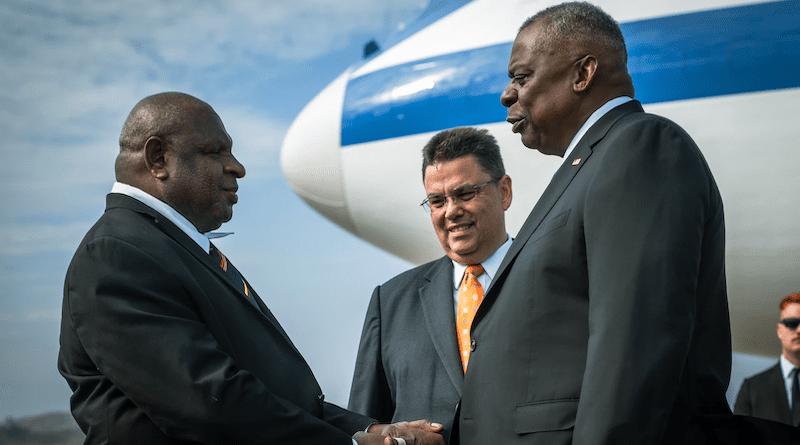Austin Says US Not Seeking Permanent Military Base In Papua New Guinea
By BenarNews
By Harry Pearl
Washington is not seeking a permanent military base in Papua New Guinea under a new bilateral agreement, U.S. Defense Secretary Lloyd Austin said during a visit to the Pacific island nation on Thursday.
Austin is one of two members of President Joe Biden’s cabinet to visit counties in Oceania this week, where the United States and rival superpower China are competing for influence.
The deal in Papua New Guinea has been criticized by some for being overly accommodative to American interests and possibly upsetting for China, a major trading partner. But Austin on Thursday stressed a U.S. commitment to the sovereignty and autonomy of Papua New Guinea.
“I just want to be clear, we are not seeking a permanent base in PNG,” Austin said during a joint press conference with Papua New Guinea Prime Minister James Marape.
“Our goal is to strengthen PNG’s ability to defend itself and protect its interests.”
The agreement, signed on May 22, is part of Washington’s efforts to counter Beijing’s growing influence in the Pacific islands region.
China, over several decades, has become a substantial source of trade, infrastructure and aid for developing Pacific island countries as it seeks to isolate Taiwan diplomatically and build its own set of global institutions.
Last year, China signed a security pact with the Solomon Islands, alarming the U.S. and its allies such as Australia and underlining the heightened geopolitical competition in the region.
Marape on Thursday said the defense cooperation agreement, which is yet to be ratified by Parliament, formalized the ad-hoc relationship that Papua New Guinea already had with the U.S. military.
Papua New Guinea was building its defense capabilities to keep the country safe, including from illegal fishing and transnational crime, “not for joint war preparation.”
“I want to give assurance to everybody here that this is not about setting out for war, but setting a presence for nation building in PNG and this part of the Pacific,” he said.
During their meetings, Marape and Austin also spoke about bilateral efforts to address challenges such as illegal, unreported, and unregulated fishing in the Indo-Pacific region.
The U.S. is preparing to send a U.S. Coast Guard cutter to Papua New Guinea as part of the shiprider agreement, a U.S. readout of the two officials’ meetings said. The shiprider agreement allows Papua New Guinea’s enforcement personnel to ride on U.S. vessels to enforce maritime laws and protect natural resources and the environment.
Austin is on his way to Brisbane, Australia where he and U.S. Secretary of State Antony Blinken will meet their Australian counterparts for the annual Australia–U.S. Ministerial Consultations.
‘Door open’ to AUKUS
Blinken on Wednesday visited the tiny Pacific kingdom of Tonga, where the U.S. opened a new embassy in May, and touched down for a series of meetings in New Zealand on Thursday.
At a press conference in Wellington, Blinken said that the “door is very much open” for New Zealand to engage with the second pillar of the AUKUS security pact between the U.S., Britain and Australia.
“New Zealand is a deeply trusted partner … We’ve long worked together on the most important national security issues. And so as we further develop AUKUS, as I said, the door is open to engagement.”
One of the primary goals of AUKUS is a plan for the Australians to acquire nuclear-powered submarines to help America police the Indo-Pacific super region.
The second pillar focuses on cooperation in advanced military technology.
New Zealand Foreign Affairs Minister Nanaia Mahuta said the country is exploring the full extent of pillar two opportunities under AUKUS, but stressed that Wellington was “not prepared to compromise or change our nuclear-free position.”
The U.S., United Kingdom and France carried out more than 300 nuclear detonations in the Pacific from 1946 to 1966 as part of their weapons programs.
The testing hardened public opinion against nuclear weapons in New Zealand, which banned visits by nuclear-propelled warships in the mid-1980s and later passed legislation making the country a nuclear-free zone.
New Zealand’s refusal to allow the port call of USS Buchanan in 1985, after the ship would not confirm if it had no nuclear weapons onboard, resulted in Washington downgrading its diplomatic relationship with Wellington. The U.S. suspended its security guarantee under the trilateral ANZUS treaty, effectively freezing New Zealand out.
Diplomatic ties between the two nations have found common ground in regional security interests in recent years, especially over China’s growing assertiveness.
When asked about China’s police and security agreements with the Solomon Islands, Mahuta on Thursday said that New Zealand respected Honiara’s sovereignty, but the “lack of openness and transparency” surrounding them had raised concerns.
“We will continue to push on the Solomon Islands [Prime Minister Manasseh] Sogavare to make clear what the full extent of those arrangements are so we can assess what that means for our region,” she said.

